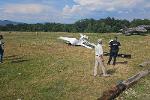Some 80 youngsters work together in a block of flats in Bucharest to produce electronic games for the largest market in the world: the United States. Two of their products were already labeled there as "Greatest Hits".
The Fun Labs Company was founded by its manager, Adrian Filippini. "It was a natural continuation of the fun I had as a child, playing with toys, dismembering them and then putting them together again," explained Filippini. Fun Labs is what one calls a "developer" of games, while on its products, along the Fun Labs logo, stay those of the publisher.
In order to develop an electronic game one needs and "engine". Many companies pay as much as one million dollars for an engine, when that works for several platforms, but Fun Labs produced in-house the engine.
In 1999, Filippini convinced a Romanian investor to give him the money for his start-up business. The first two years the company built its name producing demos to land a contract.
"We knocked on every door, but most of them where slam-shut in our face. But one has to persevere, and find the window open to get inside," said Filippini.
He managed to convince one of the biggest American companies in the field, Activison, which ended the fiscal year with 1.4 billion dollars net earnings.
Developing games is one of the most complex fields of IT programming, explained Filippini, since it is not all the work of programmers alone. Architects, sculptors and actors are on the team too: architects build the artistic design, sculptors model the images, and actors tell the story line.
Still, the publisher is the one who orders the product according to its knowledge of the American market. To that end there is constant messaging between the game developer and the publisher.
"If that does not go well, the publisher may at any point take the project from me and give it









